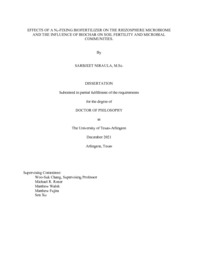
ATTENTION: The works hosted here are being migrated to a new repository that will consolidate resources, improve discoverability, and better show UTA's research impact on the global community. We will update authors as the migration progresses. Please see MavMatrix for more information.
Show simple item record
| dc.contributor.advisor | Chang, Woo-Suk | |
| dc.creator | Niraula, Sarbjeet | |
| dc.date.accessioned | 2022-01-25T18:23:01Z | |
| dc.date.available | 2022-01-25T18:23:01Z | |
| dc.date.created | 2021-12 | |
| dc.date.issued | 2021-12-20 | |
| dc.date.submitted | December 2021 | |
| dc.identifier.uri | http://hdl.handle.net/10106/30229 | |
| dc.description.abstract | The rhizosphere microbiota and endosymbionts are the major contributors to biogeochemical cycling and significantly impact the associated host plant. Their association with plant roots is inevitable for plant health and development. The application of bio inoculants that promote plant growth and productivity is a promising alternative to chemical fertilizers in agricultural fields because of their nutrient solubilization activity, and are considered environmentally safe. However, their impact on the soil microbiome has been least studied. The use of bio-inoculants may have favorable or unfavorable impacts on the native microbial community in the rhizosphere. Therefore, we attempt to evaluate the effects of a novel drought-
tolerant bioinoculant treatment on the rhizosphere microbial community of the Soybean plant. In addition, constant development and refinement of bio-inoculant are also vital to sustained
potential. Traditionally, most studies focused on identifying differentially expressed genes to identify molecular markers to develop a novel bioinoculant. However, underlying molecular mechanisms involve much more complex interactions among genes. We performed a network-based analysis to identify modules and hub genes in Bradyrhizobium japonicum under desiccation stress. This study provides further understanding of gene responses to water stress, and helps us develop a novel molecular marker for bio-inoculant selection and development. Along with developing an efficient bio-inoculant, the persistence of the inoculant in the soil under abiotic
stressors is another primary concern. Recently, biochar has been proposed for various agronomic applications, including improved plant growth and soil fertility. We studied the effects of dairy effluent-saturated (SBC) and unsaturated wood-derived biochar (UBC) on Bermudagrass (Cynodon spp.) growth, soil fertility, and microbial communities in a greenhouse. Our research will provide a direction to increase the efficiency of bio-inoculant by biochar, thereby helping in sustainable agriculture. | |
| dc.format.mimetype | application/pdf | |
| dc.language.iso | en_US | |
| dc.subject | Microbial community | |
| dc.subject | Rhizosphere microbiome | |
| dc.subject | Biochar | |
| dc.subject | Gene co-expression network | |
| dc.title | EFFECTS OF A N2-FIXING BIOFERTILIZER ON THE RHIZOSPHERE MICROBIOME AND THE INFLUENCE OF BIOCHAR ON SOIL FERTILITY AND MICROBIAL COMMUNITIES | |
| dc.type | Thesis | |
| dc.contributor.committeeMember | Xu, Sen | |
| dc.degree.department | Biology | |
| dc.degree.name | Doctor of Philosophy in Quantative Biology | |
| dc.date.updated | 2022-01-25T18:23:02Z | |
| thesis.degree.department | Biology | |
| thesis.degree.grantor | The University of Texas at Arlington | |
| thesis.degree.level | Doctoral | |
| thesis.degree.name | Doctor of Philosophy in Quantitative Biology | |
| dc.type.material | text | |
| dc.creator.orcid | 0000-0002-8425-4782 | |
Files in this item
- Name:
- NIRAULA-DISSERTATION-2021.pdf
- Size:
- 15.24Mb
- Format:
- PDF
This item appears in the following Collection(s)
Show simple item record


